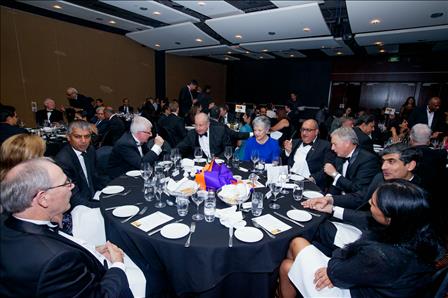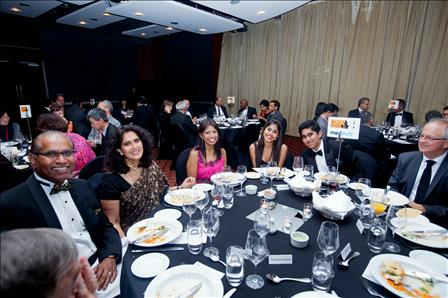Second of three parts
The Judiciary does not often overstep the mark, but it happened recently in the Maldives where they reinterpreted what Parliament had decided.
Dictators who use the police and the military for political purposes are equally abusive of the institutions.
In a democracy, the Police answer to the law for their operations and to the Government only for their administration. The military is there for the defence of the nation, and not as the arm of a political party.
There are many countries that border on dysfunctionality, although not permanently crossing that red line.
So what do people want, expect and deserve?
Common factors
It is different everywhere, but when you look for a common denominator I would say that it boils down to the fact that everyone wants a better life for their children than they had themselves. This can be achieved if you are living in a truly democratic country.
UN Secretary General Ban Ki Moon put it in another way recently, when he said, “You cannot have development without peace and you cannot have peace without development and neither of these without the rule of law.”
Democracy is not perfect and does not always show itself in the best light.
It is not efficient – it is not meant to be; but it is meant to reflect the will of the people.
It should make people feel safe, secure if not comfortable.
Sir Winston Churchill once said, “The essential aspects of democracy are the freedom of the individual within the framework of the laws passed by Parliament in order to live life as he pleases along with the uniform enforcement of the law. Without this foundation, there can be no civilisation or freedom.”
The great Abraham Lincoln said, “You govern with the consent of the governed,” meaning, you work at it daily.

Vino Ramayah and his family and guests at the Lecture
Military role
A lot of work that I have done in recent years is among developing countries including those in Africa, Asia, the Pacific and the Caribbean, where people can see on TV and social media what others in the developed world are getting by way of economic and social freedoms. They want it too.
Unfortunately, many leaders have told me, “Don, my people cannot eat democracy,” indicating the frustration that they face with the democratic institutions and processes. They have sometimes developed a willingness to ride over them ‘for the people.’
Such modus operandi has become their norm.
They really want to give their people education, houses, sealed roads, Sky TV and fresh water and it is those political demands that encourage an erstwhile leader to diminish any opposition.
Power corrupts
This then becomes the power that corrupts. We saw it earlier this year in the Ukraine, where the people of the Ukraine were more concerned and angry about an autocratic, corrupt and abusive government than they were about Russian hegemony. Then, having ousted their corrupt and autocratic leader, although democratically elected, they had to face down real hegemony of Russia in the Crimea. Until MH17 (the missing Malaysian Airlines aircraft with passengers and crew on board), there was almost a deafening silence and complicity in this from the West.
A variety of things signal the first move by leaders in diminishing their democracy – when he or she takes more power into the executive, the most major event is when they shut down the Parliament.
Dictators love power today in the same way as kings and queens loved power in the 17th and 18th century. Neither gives it up lightly.
However other pressures have being brought to bear.

Clockwise from left Robert Khan, Tim Groser, Sir Don McKinnon, Lady Susan Satyanand, Sir Anand Satyanand, Phil Goff, Ravi Thapar, Prakashni Khan, Len Brown and Mary Goff (hidden)
Confidence lacking
In recent times, we have had the global financial crisis, the rise of China and the collapse of the Arab spring, all of which have created concerns, raised questions and started new debates, mostly about what democracy has not done. Couple that to political parties in Bangladesh, Cambodia and Thailand boycotting elections, separatist movements in Scotland, Tibet, Aceh, Catalonia and some Indian states, and you get a real sense of a lack of confidence in nation states.
Political gridlock in the US even undermines institutions in the land of the free.
This was not what was expected when people got democracy in any of these places.
The financial crisis not only gave us all a shock but also left most dismayed when those who made millions walked away from those who lost life’s savings.
Governments, expected to provide some protection, suddenly seemed impotent.
As China was able to double people’s standards of living every decade compared with nearly 30 years in the west, of course we want to know why we cannot get those results; and when Egypt rids itself of the dictatorial Hosni Mubarak and is replaced by a winner take all ‘Muslim Brotherhood,’ then perhaps no surprise when the army takes over and completes the circle.
Hard questions
How can you remain confident that democracy is still relevant when you see these sorts of examples of prosperity without democracy and vice-versa?
How can we ensure that we do not see the baby thrown out with the bathwater?
The underlying issue is always the same, it is the leadership that is too centralised, and when it cannot deliver, becomes more centralised and more autocratic.
So how do we get more oxygen into democracy? How do we ensure that we do not believe that a leader with more power can improve our lives, give us something we would not otherwise get? When will China become a democracy?
(To be continued)
Editor’s Note: Paucity of space has prompted us to serialise into three parts the speech of Sir McKinnon at the Indian Newslink Sir Anand Satyanand Lecture (held on July 28, 2014 at Pullman Hotel, Auckland). The final part will appear in our next issue. The speech of Sir Anand Satyanand appears under Viewlink in this issue.






